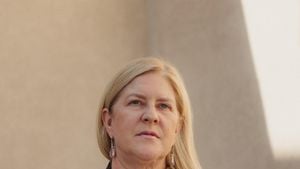Former President Donald Trump’s selection of Brendan Carr as his nominee for chair of the Federal Communications Commission (FCC) has sparked significant discussion about the future of communication regulation and the relationship between government and big tech. Carr, who has been described as a staunch critic of overreach by technology companies, is poised to reshape the regulatory framework governing telecommunications, broadcasting, and internet services across the United States.
Brendan Carr, originally appointed as FCC commissioner by Trump during his first term, has since been reappointed by President Joe Biden and recently confirmed there. With Carr’s nomination, both political parties strangely find common ground on a heated issue: the potential repeal or revision of Section 230, which offers protection to social media platforms from legal liability for the content users post. Section 230 has become increasingly contentious as misinformation and platform accountability come to the forefront of public discourse.
While Section 230's supporters argue it protects freedom of speech online, critics, including Carr, assert it enables large tech companies to escape accountability. Carr openly advocates for adjustments to this legal shield. He expressed his goal of revisiting Section 230’s protections by implementing rules to limit the ability of these companies to remove content without warnings—a point he elaborates on within the 950-page conservative policy document, Project 2025, which has garnered attention for its ambitious framework aimed at guiding Trump’s future administration.
Upon Carr's appointment, the FCC may pivot from its current posture under Biden’s administration, which sought to restore net neutrality—rules ensuring all internet traffic is treated equally—to aligning more closely with market-based deregulation. Carr's own writings suggest he intends to support moves to dismantle these net neutrality regulations, reinstated this past year through reclassification of broadband services under stricter oversight. This shift would likely benefit telecom and media mergers and acquisitions, as Carr’s approach, historically aligned with the interests of traditional media and larger telecommunications firms, hints at increased industry consolidation.
Recent comments from Carr highlight his belief in the necessity of curbing big tech's power, stating, "It is hard to envision another industry where the gap between power and accountability is more pronounced." His association with the Heritage Foundation and the philosophies laid out within Project 2025 indicate the priorities he aims to push through if confirmed. Carr argues for moving forward with new regulations encompassing content moderation practices on social media platforms, intending to restrict the current latitude these platforms have to censor users whose views diverge from the political mainstream.
This road does not just streamline the regulatory process but also poses potential challenges to the media’s ability to fairly cover political events. For example, pre-nomination rhetoric among Republican leaders highlighted concerns about what they perceived as biased coverage from traditional media. Carr seems poised to escalate these tensions, actively contemplating repercussions against networks he claims violate FCC standards—most tellingly, he has threatened NBC with license sanctions surrounding their airing of Vice President Kamala Harris during the election season, even alleging violations of the equal-time rule.
But what does this appointment mean for the likes of tech leaders like Elon Musk? Carr has expressed admiration for Musk’s ventures, particularly Starlink, the satellite internet service under SpaceX, indicating he would welcome greater access to federal funds for these projects. Given Musk’s past struggles with securing government contracts under the current FCC administration, it seems Carr’s nomination could fortuitously realign opportunities favoring Musk's business pursuits. Both Carr and Trump have overtly challenged the regulatory boundaries imposed on Musk’s companies, raising suggestions of favoritism.
Supporters of this new regulatory direction argue it's about restoring balance and accountability to platforms known for amplifying misinformation and concerns over censorship against free expression. Nonetheless, there is unease about how these proposed changes might dilute the protections currently safeguarding diverse viewpoints across media platforms. It creates speculation about whether Carr’s proposed deregulation could inadvertently enable the spread of harmful misinformation or limit competition among tech giants.
Brendan Carr's expected FCC chairmanship could prompt sweeping regulatory adjustments aimed not only at reassessing existing frameworks like Section 230 but also potentially enriching the control conservative media outlets have over local and national narratives. Carr implies he will support policies favorable to media acquisitions under the pretense of serving the public interest, even as critics voice the risk of sidelining various perspectives under powerful corporate interests.
Although the Republican majority within the Senate implies Carr’s confirmation seems likely, many voices from across the political spectrum will remain cautious about these developments. Some critics remain vigilant about how Carr will prioritize interests at the FCC and the long-term ramifications of eroding protections established to maintain fairness within the media environment and safeguard against the chilling effects of government retribution against dissenting voices. The tensions surrounding these issues are expected to persist throughout the anticipated confirmation hearings, leaving the media and public eagerly attuned to the transformations likely to shape the communications sector.
Brendan Carr's potential leadership signifies not only a significant shift within the FCC but also highlights the growing convergence of business interests with governmental regulatory authority, particularly as aligned with controversial figures such as Donald Trump. With mounting pressure on tech platforms and the looming transformation of regulatory policies, observers will be watching closely to see how Carr's nomination impacts the very fabric of communication and information disseminated across America.



